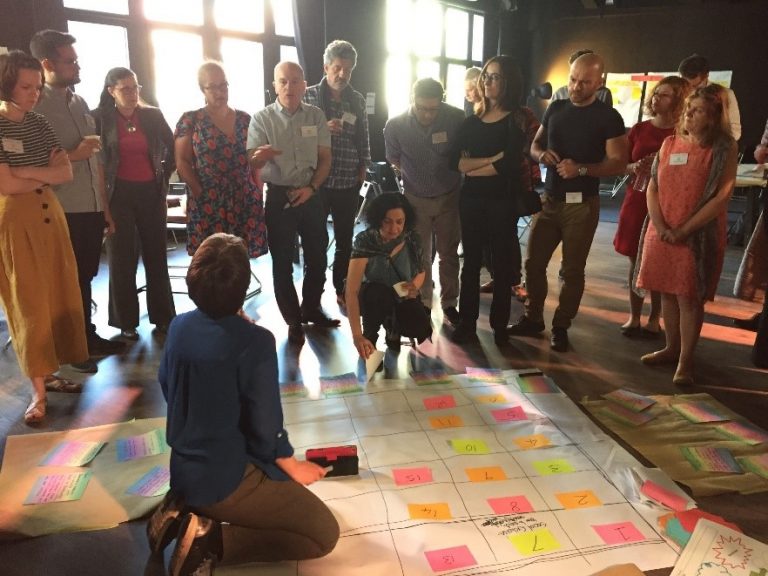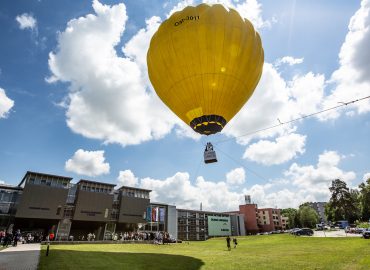 On April 24-25 in Bucharest, the Joint Programme Initiative (JPI) Urban Europe held its first Agora Strategic Dialogue on the theme “Dilemmas and Potentials of Urban Transitions towards Sustainable Urban Futures”.
On April 24-25 in Bucharest, the Joint Programme Initiative (JPI) Urban Europe held its first Agora Strategic Dialogue on the theme “Dilemmas and Potentials of Urban Transitions towards Sustainable Urban Futures”.
The event brought together 50 stakeholders (experts and representatives of European cities) with diverse urban backgrounds from different EU member states to discuss urban issues and challenges to help set priorities for the next JPI Urban Europe strategic research and innovation agenda and to connect to UN 2030 Agenda for Sustainable Development.
ERAdiate was represented by Dr. Pourhashem who contributed to discussions on the core role of safety and security in creating sustainable urban mobility and the gender related issues of transport infrastructures. Participants also discussed about other transport-related issues such as accessibility and connectivity, and more general problems linked to the environmental sustainability of urban areas that needs special attention in the transition towards a future that maximizes the sustainability and livability of European cities for all citizens.
 Dr. Pourhashem also participated in the COST Connect Event on “How to Shape a Sustainable Urban Mobility for all”, organised back-to-back with the JPI Urban Europe Agora meeting, on 25-26 April. This event brought together relevant actors, funding initiatives and researchers to reflect on the current state-of-the-art, and to identify and provide input on desirable developments on urban mobility.
Dr. Pourhashem also participated in the COST Connect Event on “How to Shape a Sustainable Urban Mobility for all”, organised back-to-back with the JPI Urban Europe Agora meeting, on 25-26 April. This event brought together relevant actors, funding initiatives and researchers to reflect on the current state-of-the-art, and to identify and provide input on desirable developments on urban mobility.
 The second day was organised in the form of table discussions whereby participants who brought forward a question were invited to host a table. The question proposed by Dr. Pourhashem “how can sustainable mobility affect the quality of life in European cities and rural areas?” captured the audience’s attention and was selected among 10 topics for table discussions. At his table, every participant – researchers, urban transport planners, policy makers, and funders – was invited to tackle different facets of the question, such as what is needed for a sustainable urban mobility, and what is the personal perception of quality of life for different contexts and age groups in the EU. Attention was drawn to what extent ICT technologies can contribute to reduce citizens unnecessary need of travel. Based on their previous experience, participants provided suggestions such as setting regulatory policy regulations, optimising public transport systems, creating incentives for sustainable travel behaviour, and training to change citizens attitudes for using active modes for CO2 emission reduction as one of the major concerns at European level.
The second day was organised in the form of table discussions whereby participants who brought forward a question were invited to host a table. The question proposed by Dr. Pourhashem “how can sustainable mobility affect the quality of life in European cities and rural areas?” captured the audience’s attention and was selected among 10 topics for table discussions. At his table, every participant – researchers, urban transport planners, policy makers, and funders – was invited to tackle different facets of the question, such as what is needed for a sustainable urban mobility, and what is the personal perception of quality of life for different contexts and age groups in the EU. Attention was drawn to what extent ICT technologies can contribute to reduce citizens unnecessary need of travel. Based on their previous experience, participants provided suggestions such as setting regulatory policy regulations, optimising public transport systems, creating incentives for sustainable travel behaviour, and training to change citizens attitudes for using active modes for CO2 emission reduction as one of the major concerns at European level.



